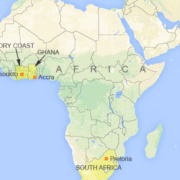World Bank: Africa’s economy has dropped to 2.7 percent
The World Bank has reduced the expectation of economic growth in the sub-Saharan African region in 2018 to 2.7% instead of the forecasts of 3.1%, largely due to the sharp growth in the economy in the continent, the bank statement said on Wednesday.
The area, which had an average annual growth rate in the economy over the year 2015, had a significant loss in its growth rate after the price of the decline decreased in 2015 – 2016.
In April, the World Bank announced that growth would be faster in 2018, with an average growth rate of 3.1 per cent, higher than 2.3 percent growth in 2017.
“The slowest growth rate in Africa under the Sahara Desert is described as a result of unpredictable economic expansion in three major Nigerian, Angola and South African nations,” the bank’s statement said.
The decline in oil production in Angola and Nigeria has led to rising oil prices, and in South Africa, the weakening of domestic consumption has resulted in a decline in agricultural activity, the World Bank reported.
Another country in the continent has had a steady growth in 2018, the bank said, including those that do not depend on products, such as Ivory Coast, Kenya and Rwanda.
Albert Zeufack, Africa’s premier prime minister in the World Bank, has dismissed the government in the area from being financially deprived of it and instead of improving productivity in support of economic recovery.
Large public debts in some countries on the continent, combining with weak currency and rising interest rates, may endanger their ability to pay their debt, the World Bank has warned.
“Policy makers in the area should be equally responsible for dealing with the new risks that arise from changes in capital flows and debt,” Zuefack said.




